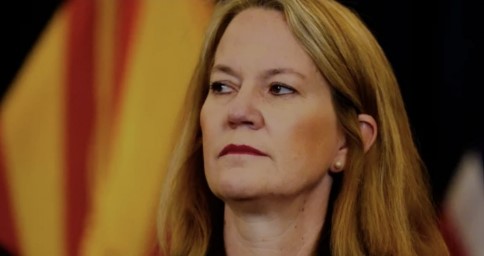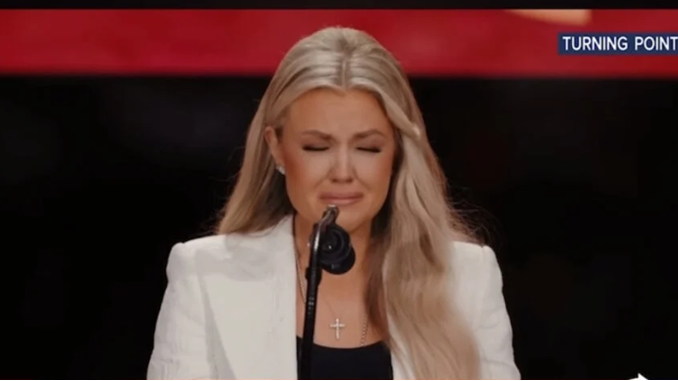
by Staff Reporter | Sep 27, 2025 | News
By Staff Reporter |
The Arizona Court of Appeals declined to accept Attorney General Kris Mayes’ appeal to prosecute President Donald Trump’s 2020 electors.
The appeals court order said in a brief ruling that, based on its “discretion,” it would not overturn a superior court ruling requiring Mayes to again secure an indictment from a grand jury.
This determination comes just four months after the Maricopa County Superior Court remanded Mayes’ case back to the grand jury.
The judge found that Mayes violated due process when seeking felony indictments for conspiracy, fraud, and forgery against 11 Trump electors.
According to the ruling, Mayes’ failure to give the grand jury a document critical to the electors’ defense, the Electoral Count Act of 1887 (ECA), before securing the indictment deprived the 2020 electors of due process. The ruling meant, effectively, that Mayes had to redo her entire case.
The 2020 electors argued they acted lawfully and in good faith under the ECA.
The attorney general attempted to justify withholding the full text of the ECA from the grand jury by citing the inclusion of “relevant portions” dispersed through memorandums, an interview, a letter, and an article from CNN. The judge declined to accept that select passages of the ECA contextualized in disparate works were equal to the document in its unabridged entirety.
“A prosecutor has a duty to instruct the grand jury on all the law applicable to the facts of the case,” stated the judge. “Due process compels the prosecutor to make a fair and impartial presentation to the grand jury. … Because the State failed to provide the ECA to the grand jury, the Court finds that the defendants were denied a substantial procedural right as guaranteed by Arizona law.”
In order to prosecute the 2020 electors, the superior court ruled, Mayes would have to disclose the full ECA to a grand jury before securing an indictment.
Arizona GOP Chairwoman Gina Swoboda said Mayes is unfit for office due to her focus on lawfare against political opponents distracting from criminal prosecutions.
“Arizona families deserve an Attorney General who prosecutes criminals, not political opponents,” said Swoboda. “Five years later, Kris Mayes is still fixated on 2020 while violent crime, fentanyl trafficking, and border chaos threaten our communities every single day. This obsession is not justice — it’s politics.”
A spokesman for Mayes would not say to reporters whether they would appeal to the state supreme court. However, Mayes’ communications director, Richie Taylor, rejected Swoboda’s accusation in a statement.
“This case has never been about anything other than preserving democracy and upholding the rule of law,’’ said Taylor. “Pretending it’s politically motivated is just a convenient way for the GOP chair to distract from the facts of the case.’’
This statement was among the first public comments issued by Taylor since deleting his social media accounts after his online commentary emerged on Turning Point USA founder and CEO Charlie Kirk’s assassination.
Tyler Bowyer, the CEO of Turning Point Action (the political action arm of TPUSA) and indicted elector in Mayes’ case, expressed relief at Monday’s ruling and scorn for Mayes’ continued expenditure of public funding on this case.
“Another huge loss for the radical AG who has wasted millions of AZ taxpayer dollars!” posted Bowyer on X.
AZ Free News is your #1 source for Arizona news and politics. You can send us news tips using this link.

by Ethan Faverino | Sep 27, 2025 | News
By Ethan Faverino |
The U.S. House of Representatives unanimously passed two bipartisan bills introduced by Congressman Abe Hamadeh (AZ-08) alongside Congresswoman Nikki Budzinski (IL-13): the Edith Nourse Rogers STEM Scholarship Opportunity Act and the Health Professionals Scholarship Program (HPSP) Improvement Act of 2025.
These landmark pieces of legislation aim to enhance veterans’ access to education and healthcare services, addressing critical needs within the veteran community.
Congressman Hamadeh, a former U.S. Army Reserve Intelligence Officer, said, “I believe that meeting the needs of our veterans should never be partisan and all government programs should be centered around what is best for the veteran. I am so grateful to Congresswoman Budzinski for sharing that commitment.”
The Edith Nourse Rogers STEM Scholarship Opportunity Act removes barriers for veterans pursuing degrees in science, technology, engineering, mathematics, and healthcare by eliminating the requirement that applicants use their Post-9/11 GI Bill benefits before applying for the scholarship.
The bill lessens the waiting period, allowing veterans to apply with 45 months of benefits remaining, compared to the current 6-month requirement, making STEM education more accessible.
The Health Professionals Scholarship Program Improvement Act of 2025 addresses the staffing shortages in the Veterans Health Administration (VHA) by mandating the Secretary of the Department of Veterans Affairs provide HPSP participants with full-time employment contracts within 90 days of completing their training and obtaining licensure.
This amendment to Section 7616 of Title 38 strengthens the HPSP, ensuring healthcare professionals can serve the veterans who are in need.
“As too many taxpayers well know, the VA spends millions of our hard-earned taxpayer dollars training healthcare professionals through scholarships,” stated Congressman Hamadeh. “Yet these same qualified professionals are forced to wait months for employment contracts after graduation, all the while our veterans suffer. It’s government inefficiency at its worst, and our veterans seem to always be paying the price. Veterans are sent to emergency rooms while skilled doctors are waiting to serve patients. That is why I introduced this bipartisan legislation with my colleague Rep. Budzinski because we saw a problem that required action.”
Ethan Faverino is a reporter for AZ Free News. You can send him news tips using this link.

by Daryl Groves | Sep 26, 2025 | Opinion
By Daryl Groves |
I had the privilege of attending Charlie Kirk’s memorial service, seated not far from the stage. To say that it was “moving”, would be an enormous understatement. Nearly 100,000 gathered in Arizona to grieve the loss of a husband, friend, and Christian leader who was gunned down in cold blood. The speeches were heartfelt. The tributes were moving. But the moment that shook the arena came when Erika Kirk, through tears, stood and forgave her husband’s killer.
The cameras captured her words — “I forgive him” — and then panned to the crowd. In that instant, as Erika spoke the hardest words a widow could speak and the audience along with millions of people watching online, witnessed a miracle of grace. (watch: Erika forgives Charlie’s murderer)
She went on to say: “Because that is what Christ did and what Charlie would do. The answer to hate is not hate. The answer we know from the gospel is love and always love”.
Forgiveness in the Heart, Justice in the Courts
This is where many stumble and could fall into a ditch on either side of the road. Forgiveness, especially in the wake of horrendous crime, is often misunderstood. People confuse forgiveness in the heart with the duties of the civil magistrate. Some imagine that forgiveness means the courts should show leniency, or that the murderer should go free. Others, on the opposite extreme, think forgiveness is weak and that personal vengeance would be a fitting response to such evil.
The truth of Scripture is a narrow road between them.
- In the heart, the Christian lays down vengeance, refuses to be mastered by bitterness, and prays for the offender to repent and be reconciled to God.
- In the state, the magistrate must still do its God-given duty (Romans 13:4, 1 Peter 2:14) to punish evil proportionately and protect the innocent.
To collapse these callings into one is to miss God’s design. Magistrates are not commanded to forgive instead of punishing. And individuals are forbidden from taking vengeance into their own hands. Erika’s testimony showed the balance: forgiveness from the heart, while leaving justice to God and His appointed servants.
A Public Witness
When Erika forgave, she was not excusing the crime, nor was she calling for the courts to drop their duty. She was releasing vengeance into God’s hands while pointing to the cross of Christ, where all true forgiveness begins. It was not weakness. It was strength clothed in tears.
Fernando Rangel, a friend and member of our organization, was in the audience. The cameras caught him rising to his feet, emotion in his eyes as he applauded Erika’s words. As we rode home together that evening, he said, “That moment was the highlight of the entire memorial service.”
And it wasn’t only Erika. One after another, speakers pointed to Christ and the Bible that day — including members of the President’s cabinet. Fernando summed it up well: “I think we just witnessed something historical.”
As we reflected on that moment, we agreed that Erika’s forgiveness embodied the two greatest commandments — loving God by obeying His Word, and loving neighbor by pointing to the gospel. Her words reminded us why our organization has partnered with TPUSA Faith and TP Action: to impact the culture by pointing to Christ, while also urging lawmakers to uphold justice and protect the innocent. On that day, both truths stood side by side.
Erika’s act matters not just personally, but nationally. At a time when even Congress could not unite even to honor a slain American — Republicans voting unanimously YES, while 58 Democrats voted NO, and dozens more avoided making a choice — Erika’s testimony lifted the conversation above partisanship and into eternal truth.
The Hardest Thing
Ultimately, forgiveness requires a miracle. By nature, we want revenge. By instinct, we want the offender to hurt as much as we hurt. Erika’s words were not natural; they were supernatural. It is highly likely that the hardest thing she’s ever had to do was trust God in this tragic situation. But she knows that God will work all things together for good to those who love Him and are called according to His purpose (Romans 8:28).
Forgiveness does not mean justice will not be done. Forgiveness means Erika refuses to let hatred master her heart. It means she entrusts vengeance to God, justice to the courts, and her husband’s legacy to Christ.
The Way Forward
America must learn again the difference between vengeance and justice, between forgiveness and excusing evil. If magistrates “forgive” by refusing to punish, they become unjust. If individuals take vengeance into their own hands, they usurp God’s role. But when a Christian forgives from the heart while still affirming the need for justice, the world sees something entirely different: God’s law and gospel on display.
Charlie Kirk spent his life calling people to truth and liberty. At his memorial, Erika Kirk showed the world the deepest truth and the highest liberty: the freedom of a heart released from vengeance because Christ has forgiven her.
In that moment, America witnessed something greater than politics — the power of the gospel to free sinners, heal wounds, and keep a soul anchored even in unspeakable loss.
Daryl Groves is the Vice President of Red State Reform.

by Matthew Holloway | Sep 26, 2025 | Education, News
By Matthew Holloway |
After overcoming months of stonewalling, the Goldwater Institute has issued a report revealing that school district superintendents in Arizona are awarded some of the most lucrative public service contracts in the state.
The report, by Goldwater’s Director of Legal Strategy for Education Policy Christopher Thomas, uncovered perks including “car allowances,” performance bonuses, duplicate private retirement packages (“funding private retirement accounts on top of their already generous state pension benefits”), and “generous personal and vacation leave banks” that can be “cashed out.”
“For taxpayers, the secrecy should set off alarms,” Thomas said in an article for Goldwater. “Superintendents are not just any employee—they are the CEOs of their districts, the highest-paid public servants in many counties. They are also the only officials directly accountable to the elected school board. The superintendent’s job is important, and high salaries may be justified. But the current system of secrecy and delay erodes public trust.”
In a post to X, the Goldwater noted that the superintendents enjoy, “Duplicate retirement packages. Monthly car allowances large enough to lease high-end sports cars. Performance bonuses,” and added, “These are just some of the benefits that AZ school superintendents receive that make them among the state’s highest paid public employees…”
In the text of the report entitled, “The Hidden Ways Arizona School Superintendents Are Paid,” Thomas analyzed contracts from 41 of the largest school districts in Arizona, extracted over four months despite “district stonewalling,” and “a tangle of complex contract provisions that school boards, and the superintendents themselves, deliberately design to mask the full measure of compensation from taxpayers.“
Perhaps the most egregious example highlighted in the report is the compensation package for the embattled Superintendent of the Tolleson Union High School District, Jeremy Calles.
Although the district ranks only 16th in size statewide—and continues to face corruption allegations while posting student proficiency rates below both state and peer averages (21% in math and 26% in English)—Superintendent Calles receives an annual compensation package of $491,360, exceeding that of every other surveyed superintendent by more than $100,000.
Calles’ full earnings include a base salary of $361,584, already the highest in Arizona by $111,000, per Goldwater, plus $72,316 in performance pay, substantial retirement contributions beyond his state pension, a car allowance, and the ability to bank up to 120 unused personal days for a potential $166,184 cashout upon his departure from office.
The Tolleson Union High School District is hardly unique in this respect, according to the report. Monthly stipends or “car allowances” are in place at districts ranging from $500 per month at Marana USD and Littleton ESD to as much as $1,250 per month in Amphitheater USD and Sahuarita USD. Some districts even offer these as annual lump sums, such as Tucson USD, which offers a cool $20,000 annually, or Laveen ESD, which comes in just shy at $19,475 per year.
Concluding his report for the Goldwater Institute, Thomas summarized both the extravagant compensation packages and the seemingly deliberate lack of taxpayer transparency into them. “Superintendents have important jobs. In each district, they are the one employee the school board hires, supervises, and may ultimately terminate,” he said. “The superintendent is responsible for student achievement, implementing board policy, recommending staff hires, and overseeing school district finances. They understandably command the highest salary in the school district. However, there should be greater transparency in just how much they are paid. Their contracts may be among the most important public documents held by school districts. Because of this, these contracts should be readily available to the public.”
Thomas further recommended corrective action, adding, “In addition, school districts should publish total compensation analyses for their superintendents, listing the value of all the perks that are included in their contracts. It is likely that most school board members do not fully understand how their superintendent is paid, nor all the sources of compensation the superintendent receives. Surprisingly, many have never even seen the superintendent’s contract, and some have been denied access when they’ve requested it.”
Matthew Holloway is a senior reporter for AZ Free News. Follow him on X for his latest stories, or email tips to Matthew@azfreenews.com.

by Matthew Holloway | Sep 26, 2025 | News
By Matthew Holloway |
The full deposition of Kari Lake, acting CEO of the U.S. Agency for Global Media (USAGM), was unsealed and filed publicly on Monday in the U.S. District Court for the District of Columbia. In the September 9th questioning from plaintiffs’ lawyers in lawsuits challenging layoffs at Voice of America (VOA) and its parent agency, Lake dismantled the narratives woven by the terminated staffers in outlets like the Washington Post and NPR.
Lake has been accused of “gutting” VOA through alleged illegal firings and union-busting. The headlines painted a scene of “fearful journalists” and “dismantling” America’s global voice, framing the cuts as a political purge in defiance of court orders. However, Lake’s sworn testimony tells a different story.
In the 549-page transcript, Lake coolly describes a deliberate, team-driven effort to comply with President Trump’s March 14, 2025, Executive Order “Continuing the Reduction of the Federal Bureaucracy,” which mandated slashing agencies like USAGM to their “statutory minimum” within seven days, as previously reported by AZ Free News.
“I effectuated — I got busy working to effectuate the President’s executive order,” Lake stated plainly during the deposition, responding to questions about her rapid response to the EO. Far from the “unaware” operative depicted in the Post’s coverage—which claimed she learned of the order “the day of” and blindsided staff—Lake described proactive preparations based on “rumblings” and immediate collaboration with career officials.
“We made the decision to determine what (the) statutory minimum was, and in the process of doing that, we worked with the senior leadership at the agency to come up with what our plan would be. We placed everybody on paid leave and worked with senior leadership, career leadership, and they came up with the plan.”
This new information decisively counters the union-led narrative of a “union-busting attack on workers’ First Amendment rights,” as put forth by the American Federation of Government Employees (AFGE) and amplified by Politico. Lake emphasized that reductions in force (RIFs) affecting hundreds were “the same process that went into the first one,” guided by non-partisan experts, such as Victor Morales, a 36-year agency veteran.
“This was an agency decision based on everything that’s led up to [it],” she added, rejecting any indications of personal retaliation. These firings also included a subsequent round after an August 28 executive order excluded the USAGM from the Federal Labor-Management Relations Program.
The deposition also highlighted Lake’s repeated warnings about foreign infiltration plaguing USAGM, which were emphasized during her congressional testimony with Congressman Abe Hamadeh in June. “This place is rotten. It’s rotten to the core,” she told the House Committee on Foreign Affairs. “President Trump has asked me to go in and help clean it up, and he’s also issued an executive order to reduce this agency down to its mandate, to what is mandated, statutorily required. That’s exactly what I’m doing. I don’t care if they attack me.”
Media critics have dismissed her findings as fearmongering to justify cuts, but under oath, Lake was firm, identifying “massive national security violations, including spies and terrorist sympathizers and/or supporters infiltrating the agency, eye-popping self-dealing involving contracts, grants, and high-value settlement agreements…”
Pressed on her posts to social media stating that “the CCP has infiltrated VOA and you are paying for it,” Lake confirmed her statement without hesitation, saying simply, “Yes.” When asked about Chinese Communist Party (CCP) meetings with VOA managers to shape coverage, she replied, “In the past, they have.”
These revelations appear to fly in the face of NPR’s portrayal of Lake’s reforms as baseless paranoia endangering journalists abroad, with reporters “fearful” over visa revocations amid supposed “lax security” excuses.
Instead, Lake clearly laid out the overhaul as a mission to restore integrity: “I think it’s important to effectuate the President’s executive order and make sure that what we’re putting out is honest, truthful reporting.”
She highlighted fiscal wins, like canceling an “obscenely expensive 15-year lease that burdened the taxpayers,” and anticipated operating “above the originally proposed statutory minimum” while adhering to the law.
The lawsuits, Widakuswara et al. v. Lake and Abramowitz et al. v. Lake, both stem from the firing of VOA staff and former VOA Director Michael Abramowitz, whom Lake attempted to reassign before a judge intervened to block it. But Lake invoked executive privilege on White House chats and stressed the EO’s clarity: “In the executive order, it says right here in Section 2(a), ‘such entities shall reduce the performance of their statutory functions and associated personnel to the minimum presence and function required by law.'”
Along that same line of reasoning, Solicitor General of the United States D. John Sauer announced in late August that the Department of Justice is prepared to defend the removal of Abramowitz from his position writing, “Under Article II, inferior executive officers must be removable at will by the President or by a department head acting on the President’s behalf.”
As Lake navigates the legal hurdles raised before her, her deposition emerges as a counter to the media narrative. While outlets like the Washington Post describe “contentious court battles” and “radical cuts,” Lake’s testimony underscores a lawful cleanup of a bloated, fatally infiltrated bureaucracy. She summarized the situation best, saying, “The President put out an executive order calling for the reduction to the statutory minimum,” and “it was the decision of the team, the senior leadership team, that we needed to follow the President’s executive order.”
Matthew Holloway is a senior reporter for AZ Free News. Follow him on X for his latest stories, or email tips to Matthew@azfreenews.com.





